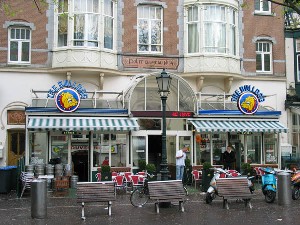Europe:
Dutch
Parliament
Ponders
Experiment
in
"Legal"
Coffeeshop
Supply
11/25/05
special to Drug War Chronicle by John Calvin Jones, PhD, JD, Department of Government, South Texas College Once again Dutch parliamentarians are seeking to make their domestic drug laws coherent, but Dutch government ministers want to maintain the schizophrenic status quo. According to the Dutch newspaper De Volkskrant, in early November a majority of the members in the Tweede Kamer (the Dutch lower house of parliament) proposed to take a first step toward legalizing domestic marijuana production -- through the implementation of an experimental "pilot project" that would supply cannabis for coffeeshops."
Despite repeated claims to the contrary by American drug warriors, marijuana is generally prohibited in the Netherlands. Though since 1976, the official-unofficial policy of the Dutch national government, local police, and prosecutors has been to license and tolerate marijuana sales in so-called coffeeshops or hash bars (which cannot stock more than 500g at one time), it has always been illegal to grow marijuana in the Netherlands. (In 1996, the Dutch government began to allow people to grow up to five plants for personal use, while not legalizing the activity.) Given the legal framework, the status quo has left the Dutch with what they call "the backdoor" problem.s Just where are coffeeshop owners supposed to get their stash? The colloquial answer is "the back door," that is clandestinely because it cannot come through the front door. Hence current Dutch policy on cannabis has been a law enforcement headache and a boon to organized crime. With no large-scale legal source of their product, coffeeshop owners are forced to go underground, into subterranean networks where it can be all too easy to end up rubbing shoulders with other black markets and other forms of criminality. Supporters of the coffee shops are quick to point out that the shops themselves, most of them small enterprises, are not connected to criminal networks. "Coffeeshop owners have nothing to do with organized crime, guns, or human trafficking, said August de Loor of the Drug Advice Bureau. "About 95% of them are small businessmen running their local coffee shop, and they are buying relatively small amounts of foreign hash and home-grown Dutch weed for their customers, so their backdoor is small, he told DRCNet."
Reaction to the proposal for some semblance of government regulation on the supply-side of the "marijuana question" by ruling coalition was swift and trite. The ministers of Justice and Internal Affairs have come out against a system of legalized domestic marijuana cultivation, claiming that international treaties do not allow it. That claim is debatable. Articles III and XIV of 1988 UN convention governing "illicit" drugs offer provisions and caveats for domestic variations in law, policy, and domestic enforcement. In this way, the 1988 convention parrots and incorporates language of previous agreements including the 1961 Single Convention, the 1925 Agreement of Geneva and the "1912 Convention" signed at The Hague, which always permitted domestic production of opium, coca, and hashish, but sought to curb the international drug trade. In a stronger statement during parliamentary debate November 14, Justice Minister Pieter Donner warned of legal consequences for cities if the Tweede Kamer authorized the cultivation experiment. "Local governments that cooperate in the experiment for regulated marijuana cultivation shall be in violation of the law," Donner said, adding that if they did, he would have to demand his prosecutors take legal action against them. While elements of the conservative Dutch government remain firmly opposed to the "backdoor" proposal and in fact would like to further tighten restrictions on the coffeeshops, it looks like a parliamentary rebellion is underway. Meanwhile, Minister Donner is left with no alternative but scare tactics and worries about the United Nations. But the UN conventions might be more flexible than Donner is willing to admit, and if regimes like those in Afghanistan are granted waivers for opium exports, Dutch transgressions in re domestic cannabis production are not likely to raise any eyebrows.
| |||||||||||||||||||||||||||||||||||||||||||||||||||||||||||||||||||||||||||||||||


